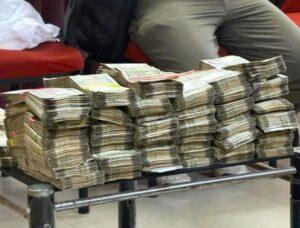India does not have a blasphemy law and that’s great. But a Section in the Indian Penal Code that comes quite close to such a law has kept Indians vulnerable to a jail term for merely expressing an opinion about a religion or a revered figure for close to a century.
The no-go areas include not just the Gods and scriptures but even godmen like Gurmeet Ram Rahim Singh Insan.
Remember how Kiku Sharda was arrested for mimicking the Dera Sacha Sauda chief last year? It was the draconian Section 295A that made it happen.
.@pbhushan1 295A of the IPC is EVIL. It MUST go. Forever. And NEVER come back. Ask for freedom to criticise, NOT freedom to lock people up. pic.twitter.com/VXRivixDAQ
— Anand Ranganathan (@ARanganathan72) April 3, 2017
The latest high-profile casualty of this archaic law is lawyer Prashant Bhushan, who has been booked for hurting religious sentiments by calling Lord Krishna an eve-teaser. Following massive social media outrage and multiple police complaints across India, Bhushan has apologised and deleted the tweet. This was before any FIR was filed against him.
Section 295A of the IPC is an abomination. As much as Prashant Bhushan’s comments highlighted his stupidity, no grounds for arrest.
— Kushan Mitra (@kushanmitra) April 3, 2017
Only last week, an arrest warrant was issued against actor Rakhi Sawant for calling Saint Valmiki a “murderer” in 2015.
So here’s the chilling fact: The vague law – which is non-bailable and does not recognise even truth as a defense – can send people to jail for insignificant remarks. It is dangerous and puts anyone who expresses an opinion at risk.
On social media platforms, where words flow freely and frequently and opinions are exposed to people from every nook and corner of the country, an offense to someone is always a possibility. And before you know it, you are the subject of a police probe.
‘The law must go’
Eminent jurists, lawyers and social commentators have time and again appealed that the colonial-era provision – inserted in the 1860 penal code in 1927 – must be repealed. Delhi-based lawyer Gautam Bhatia, author of the book Offend, Shock, or Disturb: Free Speech under the Constitution has argued that the law has outlived its utility and that “there is nothing unusual or embarrassing in reversing long-held judicial positions that are no longer apposite for contemporary society.”
295A needs to go ASAP
— Sandeep Kadian (@GappistanRadio) April 4, 2017
In fact, Subramanian Swamy filed a petition in 2015 for various hate speech laws to be declared unconstitutional. But as this author points out, the problem with Section 295A is that in 1957, in Ramji Lal Modi v State of UP, a five-judge bench of the Supreme Court upheld its constitutionality.
Interestingly, it was the offended feelings of Muslims that prompted the British to add the provision in the IPC in 1927. Down the years, it’s been (mis)used by all communities.
.@pbhushan1 By not demanding removal of Sec 295A, many are willing to let Kamlesh Tewari ROT in jail, just so that Prashant Bhushan also rots in jail.
— Anand Ranganathan (@ARanganathan72) April 3, 2017
Here’s a look at some high-profile and recent cases where the draconian law was invoked to curb FoE:
- In 2012, author and rationalist Sanal Edamaruku was booked by the Roman Catholic community in Mumbai for questioning a “miracle” that the toe of a statue of Jesus was oozing water. Sanal examined it and declared that the water was the result of an overflowing drain. Hounded out of India, Sanal is now on self-imposed exile in Finland.
- Wendy Doniger’s book The Hindus: An Alternative History published in 2009 by Viking/Penguin. A controversy involving Section 295A ensured that the published pulped the book five years later.
- In 2012, two girls were arrested for A Facebook post that criticised the shutdown of Mumbai for Shiv Sena supremo Bal Thackeray’s funeral. One of the girls went to jail for merely liking the post.
- In 2015, Hindu Mahasabha leader Kamlesh Tiwari issued a press note claiming that Prophet Mohammed was the world’s first homosexual. His comments came after Samajwadi Party minister Azam Khan said that RSS leaders are homosexuals and this is why they don’t get married. Booked under the Section, Tiwari continues to be in jail till date.
- In 2014, Salman Khan was charged under the Section by a section of Muslims simply because at an event of ‘Being Human’, a model walked the ramp with Arabic words inscribed on her T-shirt.
- Actor Rakhi Sawant was booked for hurting the sentiments of Valmiki community by calling him a “murderer”. She was reportedly arrested today.
- For comments on the Christian and Sindhi communities in a comedy roast show organised by All India Bakchod, the group was booked under the Section. They later apologised to the Christian representatives in Mumbai.

















